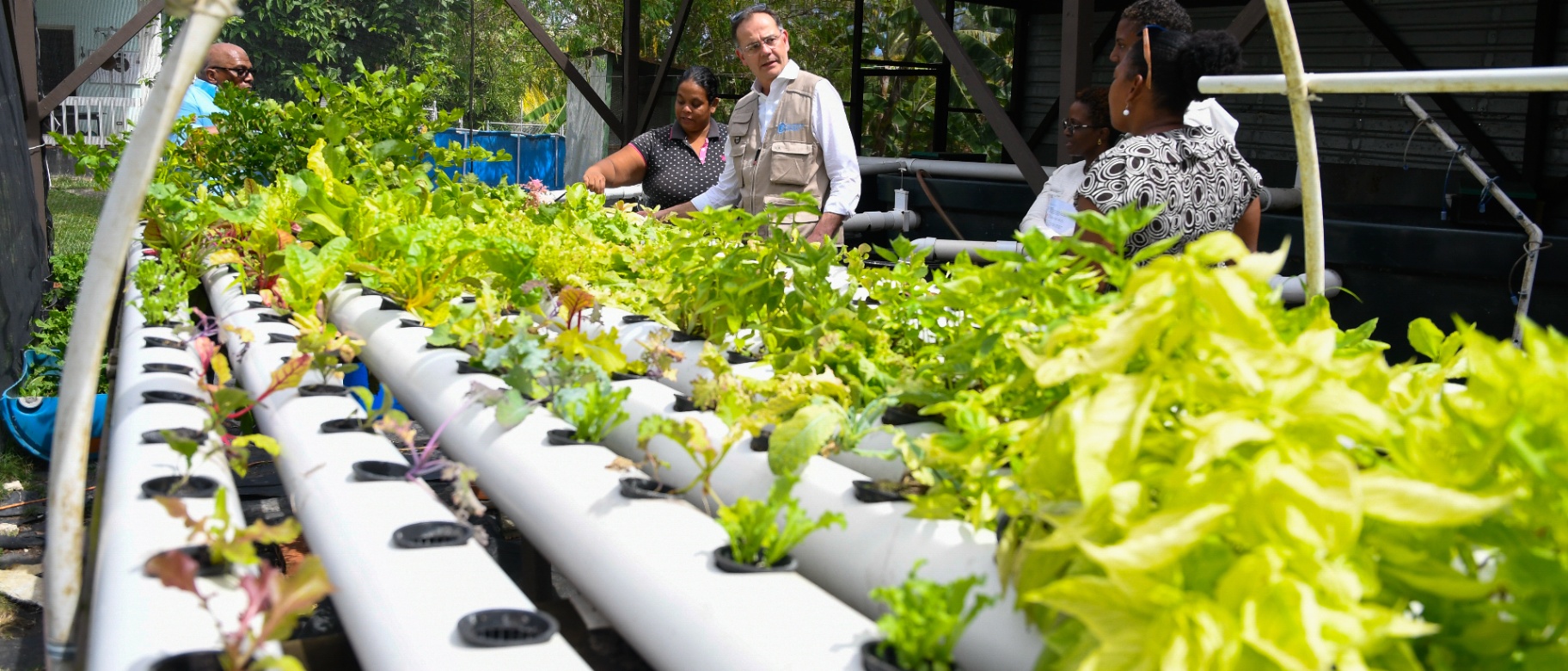FAO Climate Finance Webinar Galvanizes Solutions for Agrifood Systems in the Caribbean
Some of the piloted climate solutions in the Resilient Caribbean Initiative project.

©FAO/Randy Brooks
With a growing need for investment to address climate impacts, the Food and Agriculture Organization of the United Nations (FAO), through its Subregional Office for the Caribbean (SLC), recently concluded a two-day webinar entitled ‘Adapting Caribbean Food Systems to Climate Change: Challenges, Solutions and Funding Opportunities’. The virtual event took place on February 27 and 28, 2024 and brought together more than sixty regional stakeholders from relevant Ministries, academia, civil society organizations, CARICOM Secretariat and South-South Cooperation partners.
The two-day webinar was organized under the Mexico-CARICOM-FAO Initiative “Cooperation for Climate Change Adaptation and Resilience in the Caribbean”, also known as the Resilient Caribbean Initiative. The Initiative is supported financially by the Mexican Agency for International Cooperation for Development (AMEXCID) and Mexico’s Ministry of Foreign Affairs (SRE). As a South-South Cooperation project, several Mexican institutions provide technical support for the benefit of fourteen CARICOM countries.
Participants took part in various sessions on climate science, climate-smart agriculture and climate finance. These segments were tailored towards promoting awareness of tested climate-responsive tools, practices, and technologies for Caribbean states, as well as forging a regional strategic approach to accessing climate finance for resilient food systems.
During the webinar’s opening ceremony, Dr. Renata Clarke, FAO Subregional Coordinator for the Caribbean, delivered remarks acknowledging some of the challenges currently being faced in the agriculture and fisheries sectors. She noted that “our farmers are increasingly grappling with the changing distribution of rainfall and fishers are reporting declining stocks”. Dr. Clarke added that it was important to recognize the Government of Mexico for its effort and foresight in financing the Resilient Caribbean Initiative, which is committed to building more resilient agrifood systems in the region.
Shaun Baugh, Program Manager for Agriculture and Agro-Industry Development with CARICOM also delivered an important message during the opening ceremony. Mr. Baugh stressed that the webinar and its wider project, addresses many of the goals of CARICOM’s 25x25 Agenda, which focuses on reducing the region’s food bill by 25% by 2025. He further stated that the response and approval process of finance for projects is too slow and complicated, calling for “frank conversation with the aim of arriving at a mechanism” that can channel funds to those who need it most in the region in a timely and beneficial manner.
The highlight of day one was the sharing of tangible solutions being piloted by FAO to increase the region’s ability to adapt to climate change’s growing impact on agriculture, food systems and vulnerable communities. Under the Resilient Caribbean Initiative, farmers are receiving equipment and training to install, operate and maintain efficient irrigation systems powered by renewable energy, including solar-powered drip, hydroponic and aquaponic systems. Also, through the School Feeding Subproject, countries have been supported with the establishment of school gardens and improvement of menus for school children to consume locally produced healthy foods. In terms of data generation and analysis, FAO is applying other innovative approaches, such as drone mapping technology for farm planning and disaster preparedness, as well as the development of standard precipitation indices to improve decision-making at the farm level.
Day two of the webinar welcomed climate finance experts from FAO and key global and regional agencies, such as the Adaptation Fund and the Caribbean Development Bank (CDB). The expert presenters provided an overview of the eligibility, thematic coverage, funding windows, and required steps for accessing climate finance through the Global Environment Facility (GEF), Green Climate Fund (GCF) and Adaptation Fund (AF). Participants were encouraged to become familiar with these processes and foster partnerships to fulfill countries’ international commitments, such as their Nationally Determined Contributions under the Paris Agreement. Inputs shared during the participatory sessions over the course of two days will be compiled into a framework document, which will be presented at a high-level forum, for instance, the CARICOM Ministerial Task Force on Food Production and Food Security.
The webinar falls under component 2 of the Resilient Caribbean Initiative. This component is aimed at strengthening the technical capacities of CARICOM countries to develop impactful project proposals for submission to funding agencies like the GCF, GEF and AF, as well as supporting the implementation of previously approved projects. The project proposals under development will replicate and scale up the climate resilient solutions piloted across the Initiative. The overarching purpose is to increase flows of international climate finance for resilient food systems in Caribbean countries.
Contact
Climate Change Advocacy Specialist
CARICOM-FAO-México Initiative
Environment and Climate Change Policy Officer
Food and Agriculture Organization
